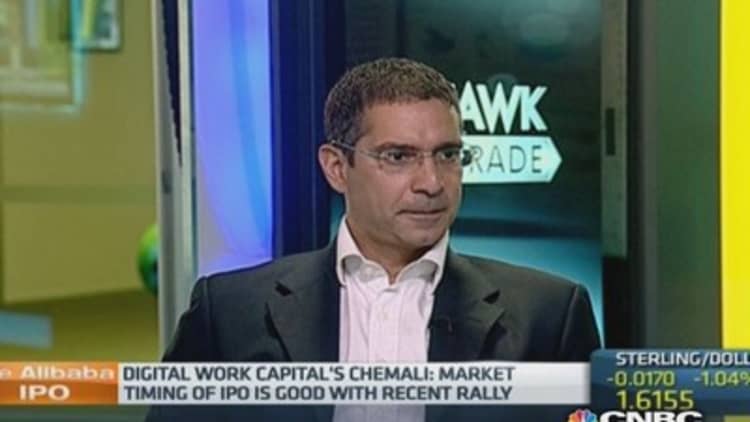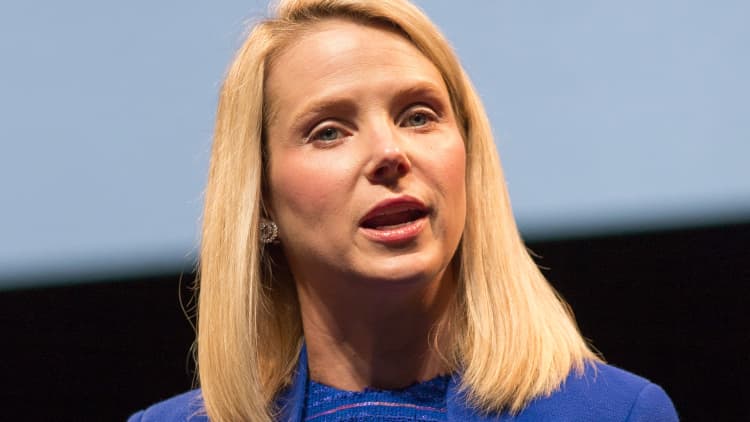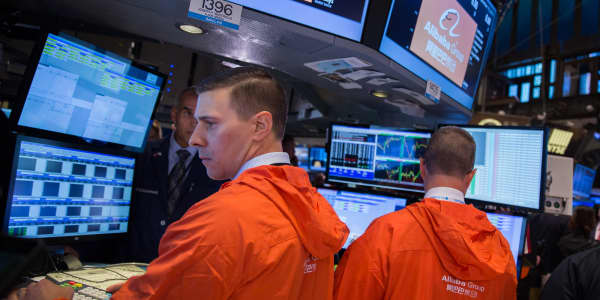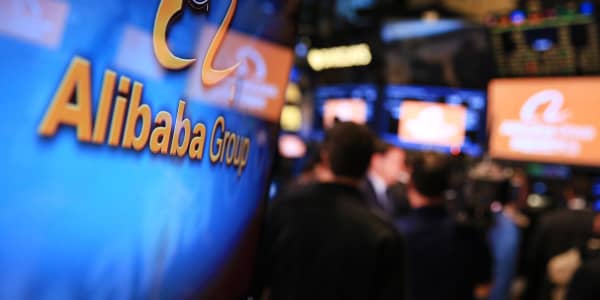When Yahoo made the risky call nine years ago to plunge $1 billion into a Chinese e-commerce company that few Americans had heard of, business was looking good. The fresh 40 percent stake in Alibaba was overshadowed by Yahoo's popular portfolio of email, finance and fantasy sports sites.
Since then, the Alibaba investment is about the only thing Yahoo has gotten right. And for shareholders, it's been the only reason to stay bullish. Heading into Alibaba's record initial public offering this week,Yahoo's stake is worth about $35 billion, representing over four-fifths of Yahoo's market value. That's after selling $7.1 billion worth of Alibaba shares in 2012.

At the time of the deal in October 2005, with longtime media executive Terry Semel at the helm, Yahoo was closing out a year in which net income doubled and sales jumped 47 percent. Even though the company had given up the lead in digital advertising to search engine Google, the two were still neck and neck in terms of ad dollars. Of the $11.4 billion in revenue between them in 2005, Yahoo had 46 percent. Plus, it was the more profitable of the two.
Now, after a disastrous (almost) decade for the Sunnyvale, California-based company, Yahoo's revenue is less than 10 percent of Google's. In the lucrative search market, Google took such command that Yahoo was eventually forced to partner with Microsoft's Bing search engine just to stay relevant.
Read MoreYahoo rewards users of search
Yahoo co-founder Jerry Yang, during his tenure running the company in 2008, rejected a $44.6 billion takeover offer from Microsoft, passing on what would have been a huge premium for investors. Meanwhile, Facebook's emergence—and Yahoo's failed attempt to purchase the social network—has eaten into Yahoo's share of the display advertising market, while other services like Twitter, Pinterest and Pandora have explored more innovative ways to capture ad dollars.
"They lost any technology edge they ever had," said Ethan Kurzweil, a partner at Bessemer Venture Partners in Menlo Park, California. "They stopped attracting cutting-edge people."
Yahoo's worldwide share of the digital advertising market has plunged to 2.5 percent, while Google's (including YouTube) has soared to 34 percent, according to eMarketer. Facebook has captured 7.8 percent. Since 2005, Google's sales have climbed ninefold, and Yahoo's have actually shrunk. Even after a two-year stock rally—fueled by Alibaba's valuation increase—Yahoo's shares have hardly budged since late 2005. Google's stock price has about tripled.
To try and right the ship, Yahoo turned to its top rival. Marissa Mayer, the 20th employee at Google, was hired as Yahoo chief executive two years ago, becoming the fourth official CEO since Semel's departure in 2007. It's an unenviable task, because aside from the Alibaba investment, investors ascribe virtually no value to the company. Meanwhile, just north in Palo Alto and San Francisco, Internet and mobile start-ups with sky-high valuations are battling it out for top engineering talent.
Reign of Marissa Mayer

Mayer's boldest move yet was the $1.1 billion acquisition of Tumblr, a blogging service that was heavy on buzz but light on revenue. That was in May 2013, and more than a year later, the deal remains a head-scratcher. Pivotal Research Group's Brian Wieser wrote in a report after second-quarter results that "even a modest level of revenue from Tumblr seemingly failed to appear."
Sarah Meron, a Yahoo spokeswoman, said the company couldn't comment because of the pre-IPO quiet period.
The Alibaba IPO will clearly strengthen Yahoo's financial standing, adding to its $4.3 billion in cash and marketable securities. According to Alibaba's latest IPO prospectus, Yahoo is selling 23 percent of its stake in the offering and the company has promised to return at least half the after-tax cash to shareholders. Should the IPO price at $66 a share, Yahoo's pretax haul would be just over $8 billion.
Yahoo will still hold more than 400 million shares of Alibaba, so shareholders expecting a post-IPO rally would be wise to hang in there.
"A lot of the easy money on the Alibaba trade has already been made," Rob Sanderson, an analyst at MKM Partners, said in a Sept. 8 interview on CNBC. "I think there's another leg here, and it will be dependent on the public market valuation of the remaining portion."
Read MoreThe Yahoo angle on Alibaba
The question analysts and investors have been asking is—what can Yahoo do as a business aside from just generate value from Alibaba? Mayer's strategy of investing in content, including a costly newsroom, is a challenging proposition in a world where more and more information is shifting to the Web, making it harder to attract user attention and advertiser interest. Mayer's other growth areas—mobile, social and video—are all businesses where Yahoo is playing catch-up.
—By CNBC's Ari Levy
Disclosure: CNBC has a content-sharing partnership with Yahoo's finance site.





